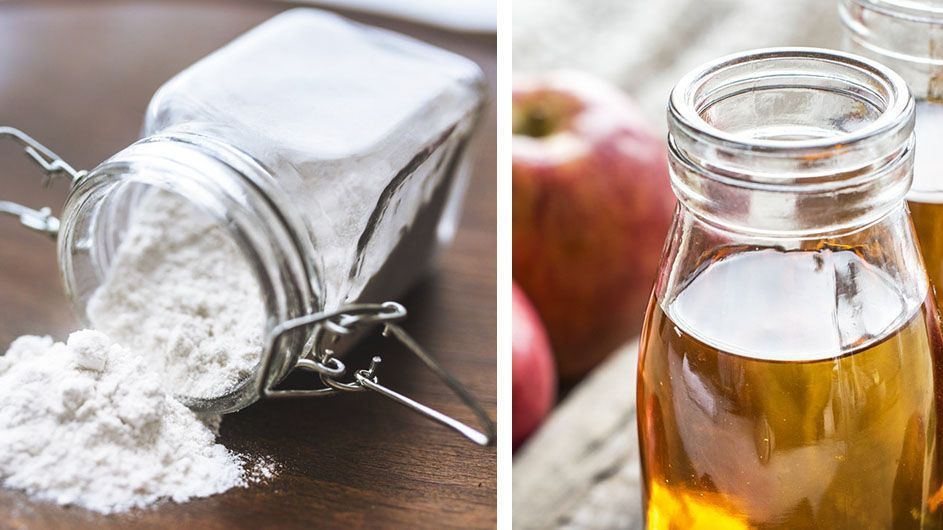Baking soda and apple cider vinegar are two common household items that have gained popularity for their potential health benefits and versatile uses. While both substances have been used for centuries for various purposes, including cooking, cleaning, and personal care, it is important to understand their benefits and risks. In this comprehensive guide, we will explore the potential benefits and risks of baking soda and apple cider vinegar, how to use them, and any precautions to consider.
Baking Soda:
- Baking soda, also known as sodium bicarbonate, is a white crystalline powder with alkaline properties. It has a wide range of applications, from cooking and baking to cleaning and personal hygiene. Here are some potential benefits of baking soda:
- Antacid properties: Baking soda is commonly used as an antacid to relieve heartburn, indigestion, and acid reflux. It works by neutralizing excess stomach acid and providing temporary relief.
- Oral hygiene: Baking soda can be used as a natural toothpaste or mouthwash due to its mild abrasive properties. It may help remove plaque, whiten teeth, and freshen breath. However, it should be used sparingly to avoid damaging tooth enamel.
- Cleaning agent: Baking soda is an effective and gentle cleaning agent. It can be used to remove stains, deodorize fabrics, clean surfaces, and unclog drains. Its alkaline nature helps break down dirt and grease.
- Skin care: Baking soda can be used as a natural exfoliant to remove dead skin cells and unclog pores. It may help reduce acne and soothe skin irritations. However, it is important to use it in moderation and perform a patch test before applying it to the skin.
While baking soda has several potential benefits, there are also some risks and precautions to consider:
- Alkalinity: Baking soda is highly alkaline, and excessive consumption or use can disrupt the body’s natural pH balance. This can lead to digestive issues, electrolyte imbalances, and metabolic alkalosis. It is important to use baking soda in moderation and follow recommended guidelines.
- Avoid excessive use on the skin: Baking soda can be abrasive, especially when used in high concentrations or on sensitive skin. Prolonged or excessive use may cause skin dryness, irritation, and redness. It is best to dilute baking soda with water or use it sparingly.
- Interactions with medications: Baking soda can interact with certain medications, such as antacids, diuretics, and blood pressure medications. It is important to consult a healthcare professional if you are taking any medications before using baking soda for medicinal purposes.
Apple Cider Vinegar:
Apple cider vinegar is a fermented liquid made from crushed apples. It has been used for centuries as a natural remedy and household product. Here are some potential benefits of apple cider vinegar:
- Digestive health: Apple cider vinegar is believed to improve digestion and promote the growth of beneficial gut bacteria. It may help relieve symptoms of indigestion, bloating, and constipation. However, scientific evidence supporting these claims is limited.
- Blood sugar control: Some studies suggest that apple cider vinegar may help regulate blood sugar levels by improving insulin sensitivity. It may be beneficial for individuals with type 2 diabetes or insulin resistance. However, more research is needed to establish its effectiveness.
- Weight management: Apple cider vinegar has been associated with appetite suppression and increased feelings of fullness, potentially aiding in weight management. However, it is not a magic solution for weight loss, and a balanced diet and regular exercise are essential.
- Skin and hair care: Apple cider vinegar can be used as a natural toner, cleanser, and hair rinse. Its acidity helps balance the skin’s pH, reduce dandruff, and add shine to hair. However, it should be diluted before use to avoid skin irritation or damage.
While apple cider vinegar has several potential benefits, there are also some risks and precautions to consider:
- Tooth enamel erosion: Apple cider vinegar is acidic and can erode tooth enamel if consumed in excessive amounts or used undiluted. It is recommended to dilute it with water or consume it as part of a meal to minimize the risk of enamel damage.
- Digestive side effects: Some individuals may experience digestive side effects such as stomach upset, nausea, or diarrhea when consuming apple cider vinegar. It is advisable to start with small amounts and monitor your body’s response.
- Medication interactions: Apple cider vinegar may interact with certain medications, including diuretics, insulin, and potassium-lowering drugs. It is important to consult a healthcare professional if you are taking any medications before incorporating apple cider vinegar into your routine.
- In conclusion, baking soda and apple cider vinegar have various potential benefits and uses. However, it is important to use them in moderation and consider the associated risks and precautions. It is advisable to consult a healthcare professional or do thorough research before using these substances for medicinal purposes. Remember, everyone’s body is unique, and what works for one person may not work for another.

